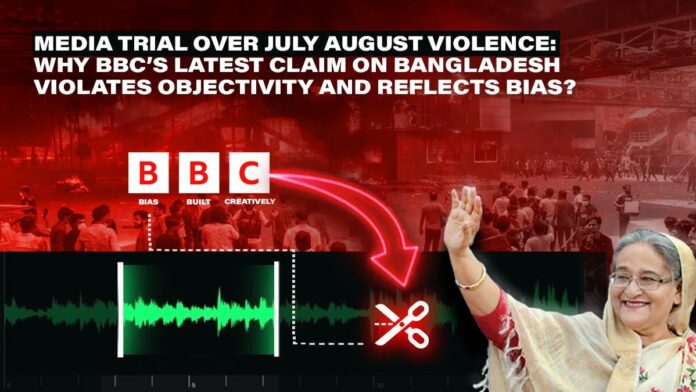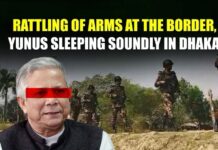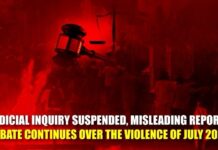
Amid ongoing rights abuses unfolding in Bangladesh under Dr Yunus led regime in contrast to the claim of ensuring justice by the noble laureate, BBC world service has released a 35 minute video and packaged it as a work of investigative journalism. The claims are startling: Sheikh Hasina authorized lethal weapon against protesters. But the stated substances do not hold ground rather appears to have been riddled with bias and a flagrant violation of BBC’s own guideline to independent and objective reportage.
The claim based on an 18 second audio but no trace of recipient and holds reasonable ground to be released by her opponents who even imposed ban on her party a glaring testament to stage a rigged trial over July August violence. Use of statements from law enforcement who already stood accused of suppressing regime dissenters. Reliance on comments from prosecutors handpicked by the regime despite proven track record of serving her opponents in court in the past. On top of that, a suspicious claim by third party organisation that even refrained from using the term “impossible” to rule out the fact that the audio can be manipulated. So the entire video manifested a clear breach of guardrails associated with objective journalism, serving the purpose of the regime that already stood accused of staging a farce with the nation in the name of judicial process, denying justice to victims of July August violence.
Referring to BBC’s claim, Dr Yunus’s office launched a publicity stunt to raise global pressure for extradition of Sheikh Hasina not paying heed to rights groups call to end ongoing rights abuses including abolishment of death sentence.
Reports show judiciary fallen to mob rule and rights abuses including crackdown against dissenters became the hallmark of the regime. And the credibility of the prosecutors and law enforcement has been questioned by lawyers who even fought legal battel on behalf of July August protesters before August 5.
How BBC concealed proven track record of partisan prosecutors
Yet its article, before the global audience BBC introduced Toby Cadman as British international human rights barrister who is currently advising Bangladesh’s International Criminal Tribunal (ICT), the court hearing cases against Hasina and others. In the piece, BBC even incorporated his quote seeking to justify the recording’s authenticity by an independent foreign expert associated with prosecution team. No wonder a desperate Cadman sought to justify the claim “The recordings are critical for establishing her role, they are clear and have been properly authenticated, and are supported by other evidence.”
But BBC deliberately refrained from mentioning the long partisan track record of Cadman with regards to defend war criminal backed party Jamaat e Islami Bangladesh in exchange of money.
A 2011 report by the Daily Star showed, Cadman was one of the three British lawyers hired by Jamaat to shape global opinion in defence of perpetrators of one of the worst war crimes in 1971, an effort anti-war crimes campaigners say crafted to deny justice to millions of victims of war crimes perpetrated by Jamaat in aid of Pakistan army to stop the birth of Bangladesh.
Read https://www.thedailystar.net/news-detail-173037
Even in 2023, Toby Cadman – Co-Head of Guernica 37 Chambers – appointed as legal counsel to Bangladesh Jamaat-e-Islami, according to G 37 website. The website still contains statement issued on behalf of his client Jamaat advocating for the outfit’s fight for the “sake of pluralism” while the outfit in the same year publicly pledged for imposition of Sariah law as future of Bangladesh if assumed power in future. https://www.g37chambers.com/post/statement-on-behalf-of-jamaat-e-islami
So Cadman holds a historic record of hired by political outfit opposed to Awami League and thereby several lawyers in Bangladesh already questioned his appointment in ICT tribunal, pointing out potential conflict of interest and possibility to serve vengeance against Awami League and the party chief Sheikh Hasina on behalf of his past client Jamaat.
In yet another deception with readers, BBC deliberately excluded the concerns raised by lawyers including those stood for protesters before August over appointment of prosecutors selected despite proven record of having allegiance with Jamaat. Rather in a betrayal with readers BBC cited the prosecutors saying they plan to use the recording as crucial evidence against Hasina.
Let’s dig out what has not been told before the world by BBC on the prosecutors and the considerable reasons that these prosecutors are out not to conduct a fair trial but to stage a farce against Awami League.
In DW Bangla interview, several legal experts including those who fought legal battel against Awami League on behalf of the protesters before August 5 condemned the selective appointment of lawyers who earlier either server on behalf of Jamaat leaders or held ranks with anti-AL outfits as politicians.
So in both cases BBC decided to conceal the controversial background of prosecutors and at the same time used their quotes as an effort to legitimize its claim on the audio clip, a clear effort to manipulate the trial process.
How Sheikh Hasina’s statement taken out of context
BBC also took quote of Sheikh Hasina out of the context for several occasions, conveniently crafted to establish its narrative. From 7:45 minute national address of Sheikh Hasina, issued on July 17, 2024, BBC selectively used parts spanning less than a minute to convince the audience that the public address was the call for crackdown against protesters. But the script of the entire address still available on social media shows she clearly expressed her condolences on loss of lives of protesters and at the same time condemned the use of violence by various political actors under cover of protest. In the speech, she clearly stated her commitment to ensure safety of students, drew distinction between general students and plots by different political forces to infiltrate the movement to achieve certain goals. She even stated that her government is fighting the legal battel in court to overturn the ruling in solidarity with the demand of students. But BBC clearly hid these facts and selectively used two sentences from the speech, another motivated effort to justify the conclusion.
Why 18 second record appears shoddy
On the other hand, counting on what appears a shoddy 18 second audio clip purportedly having voice of Sheikh Hasina , BBC made a startling claim that she ordered law enforcement to use lethal weapon.
First of all, by failing to trace identity of the recipient of her instruction in the audio, BBC cast adequate doubt on the authenticity of the audio.
Secondly, BBC has cited reference of Criminal Investigation Department, Bangladesh as one of the primary sources to authenticate the audio. But in the light of the purge in CID that is now run by partisan officers appointed by the regime and weaponization of cops in cracking down on dissenters in ten months including arbitrary detention of journalists there appears credible ground to question the veracity of CID’s claim.
Thirdly, BBC claimed to have conducted its own independent verification by sharing the recording with audio forensics experts Earshot, who said it was “highly unlikely to have been synthetically generated”. But in the world of objective journalism, a gulf of difference exists between the careful selection of phrase “highly unlikely” instead of “impossible” makes such startling claim of verification hollow.
Furthermore, the depiction of the July August episode in the video compilation marks another classic biased approach on part of BBC and falls flat in face of admissions by several of protesters and globally recognized terrorist outfit Hizbut Taharir let alone a sweeping indemnity passed by Yunus regime to help pro Yunus supporters evade justice for committing murder.
Whitewashing targeting violence against cops and jail breaks to free militants and terrorists
On top of that, BBC’s projection over use of lethal weapon by cops on protesters is the sole outcome of Sheikh Hasina’s order is riddled with contradictions as it totally left out the fact that cops were also brutally murdered and hanged, jail breaks happened allowing around 100 top terrorists and militant leaders flee and arms were looted during the protest throughout July and August.
Even the mayhem surrounding Jatrabari police station on august 5, as showed by BBC also holds half-truth. Several leading national news portals reported that protesters in Jatrabari for days locked in clashes with cops right from mid July. Several coordinators also admitted use of violence behind overthrow of Awami League, shattering efforts to project the protesters as non violent. The very fact even depicted by BBC that protesters continued to lay siege in front of Jatrabari police station even after the news reached that Sheikh Hasina left Bangladesh raised question marks over the intention of the protesters. So attributing clash between cops and protesters to Sheikh Hasina even after her departure is preposterous.
Not to mention Jatrabari that remained one of the top hotspots where protesters also turned violent, joined by political actors, as reported by Bangladesh media but again conveniently ignored by BBC. Rather what BBC did not include in the report is a pattern that saw over 450 police stations being attacked even after Hasina’s departure .
A BBC Bangla video story even showed Hizbut Tahrir spokesperson admitting their involvement in the violence, their identity concealed in the crowd of students . That supports Sheikh Hasina’s claim about terrorist involvement in the protest movement — an angle that the BBC documentary chose to ignore.
Its purpose seems clearly to justify the ouster of Sheikh Hasina, the aim of the Western-inspired regime change operation.




